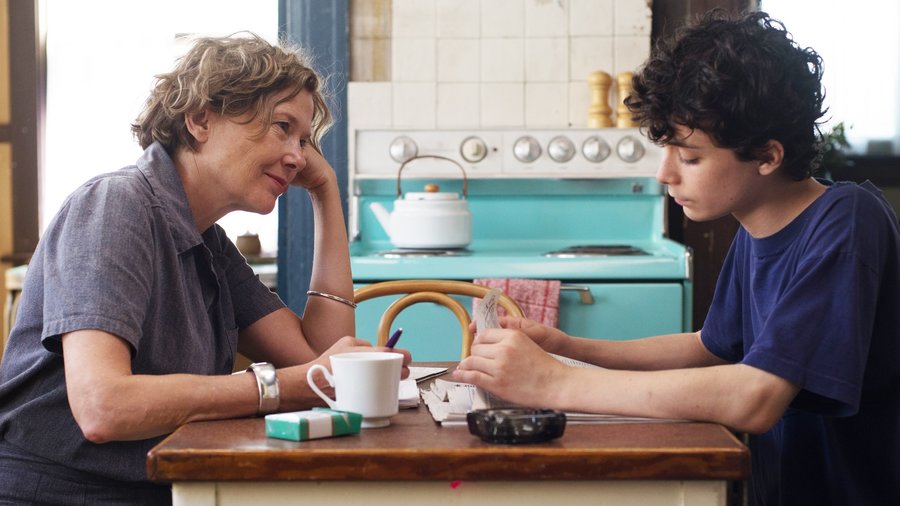There is an undefined moment in the relationship between a mother and her son, sometime around the early teen years, in which he begins to drift away. In some cases he doesn’t go far, just your typical door-closed, loud music type of thing. In others, he never comes back. In every transition though, he can’t be stopped. He cannot and will not be the same son to his mother that he was at a young and dependent age.
Maybe he turns into something better, evolves into a loving, grateful young man. But even that evolution requires change and that change can be scary to both the mother and the son. At the beginning of Mike Mills’ new movie 20th Century Women, Annette Bening’s Dorothea thinks of her 15-year-old son Jamie and says in a brittle, honest voice, “I know him less every day.”
With his dad long gone, Jamie (Lucas Jade Zumann) lives in a matriarchy. His mom, (Bening in what is maybe the year’s best performance), is a dynamic woman. She is tough because she grew up in the Depression (the film is set in 1979) but she wears Birkenstocks because they’re cool and she enjoys them. She has an open-door policy in their California home, invites strangers over for dinner and smokes a pack a day because “when I started they weren’t bad for you.” At one point, after her son gets caught skipping school, she argues in his favor and writes a note for his next absence (“please excuse Jamie from school this morning, he was involved in a small plane accident”).
Jamie and his mom are never alone in their spacious fixer-upper. Two of the rooms upstairs are rented out— one by Abbie, a maroon-haired photographer (the always great Greta Gerwig), and the other by a former-hippie-turned-mechanic named William (Billy Crudup). Julie (Elle Fanning), Jamie’s best friend, is also always around. She’s tall and beautiful and at night she sneaks away from her own house to come and sleep in his bed. But when he puts his hand on her leg she dismisses him like an over-eager child. To fifteen-year-old Jamie, this paradox is slow death.
The movie centers on Jamie’s growing up and how the people in his house shape him while also trying to navigate their own lives. This isn’t your standard coming-of-age story because, well, it doesn’t really have a plot. It feels more like a meandering collection of scenes with a common vibe and theme. The scenes are linear, sure, but there really isn’t a standard arc and the movie is better off for it.
Mills’ script is emotionally honest, very funny and, at times, fairly devastating, his characters substantive and relatable. It should be said that, at some point in this movie, Annette Bening is your mother. Something in her face, or the way she responds to a comment or a quick switch in her tone will make you think of your own mom. Hers is a performance of quiet power and unforgettable skill. Luckily for us, she isn’t the only one doing superb work. Gerwing, Crudup and Fanning all do an exceptional job of keeping up with Bening, playing their respective roles with endearing commitment. Zumann is less dynamic than them, but what 15-year-old isn’t? He’s just there to soak everything up.
Mills’ breakout film, Beginners, came out in 2010. While 20th Century Women is based loosely on Mills’ mother, Beginners is based on his dad who, very late in life, came out as gay. Starring Ewan McGregor and Christopher Plummer, it was a fine movie, memorable mostly for its brief forays into some experimental visual filmmaking— a flash of color in between scenes here, a weird little special effect there. And if that movie felt like the emergence of something, then 20th Century is a fully realized style. Mills plays with using photos, color and music to make the movie full of a distinctive life and energy. It’s all fairly subtle but it feels different and delightful.
In one scene, Dorothea asks Abbie to take her out on the town. They go to a punk club where it’s loud and raucous. At some point in the evening, Dorothea realizes she just can’t do this. She wants to be cool and relatable and, most of all, understanding of her son and this new culture but she was born in a different time. She’ll never be able to fully grasp this music, this club or her son’s passions. Not fully.
It’s this aspect of Mills’ film that’s a bit heartbreaking— the inevitability of it all. Sons drift away from their moms. We grow older and change, not always for the better. The people we want to be close to have to first let us in. These aren’t happy truths, but what Mills has created here is much more complex than a feel-good film.
A few weeks after Dorothea’s trip, Abbie takes Jamie to the same club and they have some fun. He drinks a beer, a group of them go to the beach, they take pictures of each other like friends do and the 15-year-old has a meaningless, drunken make out. It’s 1979 and he is young and free.
When they return back to the house, Dorothea is waiting up with her pack of cigarettes. But she’s not mad, as Abbie had feared. When she hears about their night she’s just kind of sad, her eyes glazing over. She tells Abbie she’s almost jealous of her.
“You get to see him out in the world, as a person,” she says. “I never will.”
“Well, here,” Abbie says and she shows Dorothea a snapshot of her son.
3.5/4 Shells



